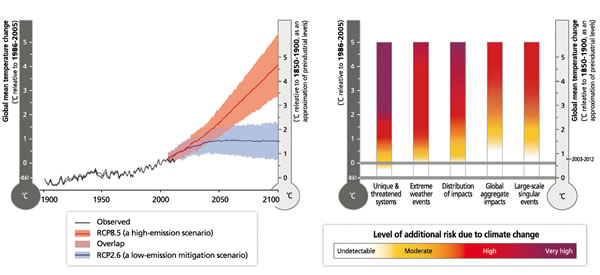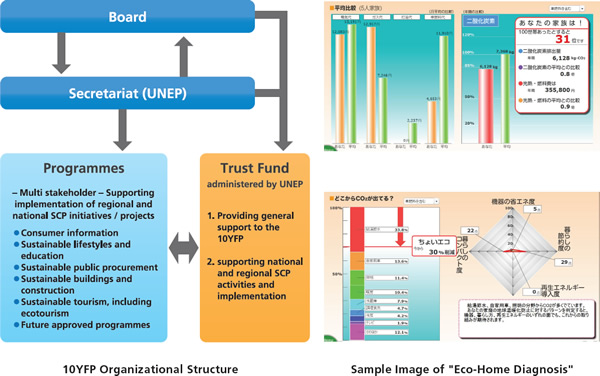Current topics
IPCC Fifth Assessment Report
(Impacts, Adaptation and Vulnerability)
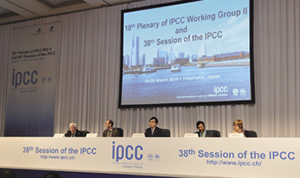
Opening ceremony of the 38th Plenary Session of the IPCC
The Intergovernmental Panel on Climate Change (IPCC) is an intergovernmental body that was established by the United Nations Environment Programme (UNEP) and the World Meteorological Organization (WMO) in 1988. The IPCC provides countries with scientific information and supports activities under the UN Framework Convention on Climate Change. The IPCC is currently working towards publication of its fifth assessment report (AR5). This report consists of four parts: scientific basis; impacts, adaptation and vulnerability; mitigation; and a synthesis.
This March, the IPCC plenary session took place in Japan for the first time. The meeting was held in Yokohama and attended by nearly 500 government officials and researchers from approximately 110 countries. The result of the meeting was the report on climate change impacts, adaptation and vulnerability.
This report discusses the emergence of climate change impacts on natural and human systems on all continents and across the oceans in recent decades, then eight key risks across sectors and regions (e.g. tidal surge damage) and five reasons for concern about those risks (levels of major cross-cutting risks) (see figure). The report also noted a need to transform actions in order to build a society that is resilient to climate change.
Currently in Japan, the Central Environment Council is deliberating the assessment of climate change impacts and risks that may affect Japan. Based on the results, we will cooperate with relevant ministries to formulate a national adaptation plan by the summer of 2015.
MORE Information
The United Nations 10-Year Framework of Programmes on Sustainable Consumption and Production

The 10-Year Framework of Programmes (10YFP) on Sustainable Consumption and Production was adopted in June 2012 at the United Nations Conference on Sustainable Development (Rio+20) in Rio de Janeiro, Brazil. The 10YFP aims at shifting the current pattern of consumption and production to a more sustainable one, and is comprised of multiple programs including consumer information, sustainable lifestyle and education, sustainable government procurement, sustainable buildings and construction, and sustainable tourism (incl. eco-tourism).
10YFP is managed by a ten-member Board, assisted by a Secretariat hosted by the United Nations Environment Programme (UNEP). Japan shares a seat on the Board with the Republic of Korea, and as such contributes to the planning and implementation of 10YFP.
In order to support this Programme, the Ministry of the Environment plans to contribute to a Trust Fund administered by UNEP. This new contribution is intended to reduce CO2 emissions by promoting a sustainable lifestyle. Such activities can be implemented under the "Sustainable Lifestyle and Education" programme under 10YFP, using tools such as "Eco-Home Diagnosis" in which experts calculate CO2 emissions from residential or commercial entities and provide technical advice to reduce it.
The Ministry of the Environment is currently working with UNEP and other partners to design the Sustainable Lifestyle and Education programme, to be launched by the end of 2014.
MORE Information
The Fifth Regional 3R* Forum in Asia and the Pacific in Surabaya
*3R : Reduce, Reuse and Recycle
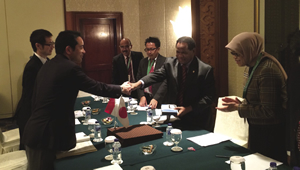
Bilateral talk with the Indonesian Minister of Environment
The Ministry of the Environment (MOE) of Japan, in cooperation with the Ministry of Environment and the Ministry of Public Works of the Government of Indonesia and the United Nations Centre for Regional Development (UNCRD), hosted the "Fifth Regional 3R Forum in Asia and the Pacific" in Surabaya, Indonesia from February 25 to 27. This meeting was convened under the overarching theme, "Multilayer Partnerships and Coalition as the Basis for 3Rs Promotion in Asia and the Pacific," and attracted about 500 participants of diverse backgrounds, including 33 governments of Asian and Pacific Island countries, intergovernmental organizations, aid agencies, the private sector, research institutions and NGOs.
Participants from the MOE included Mr. Inoue, Parliamentary Senior Vice-Minister of the Environment. Mr. Inoue held a bilateral talk with the Indonesian Minister of Environment and exchanged views on the international deployment of Japan's 3R and low-carbon technologies, city-to-city cooperation, and cooperation in the environmental field.
An accomplishment of this meeting was the adoption of the "Surabaya 3R Declaration." This declaration complements the objective of the "Hanoi 3R Declaration," to transition towards a resource-efficient and zero waste society. This declaration demonstrates a commitment to promote country-to-country, north-south-south, inter-city, inter-municipal, industry, and government-NGO cooperation towards the effective implementation of 3R.
The next (sixth) meeting will be held in the Maldives.
MORE Information
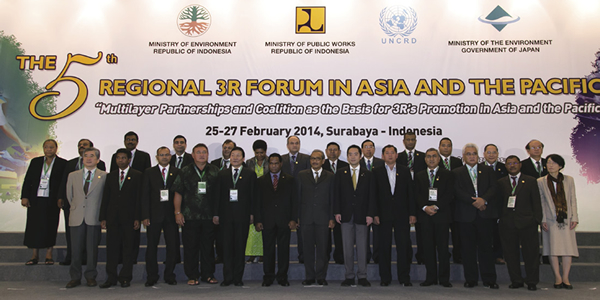
Government representatives



